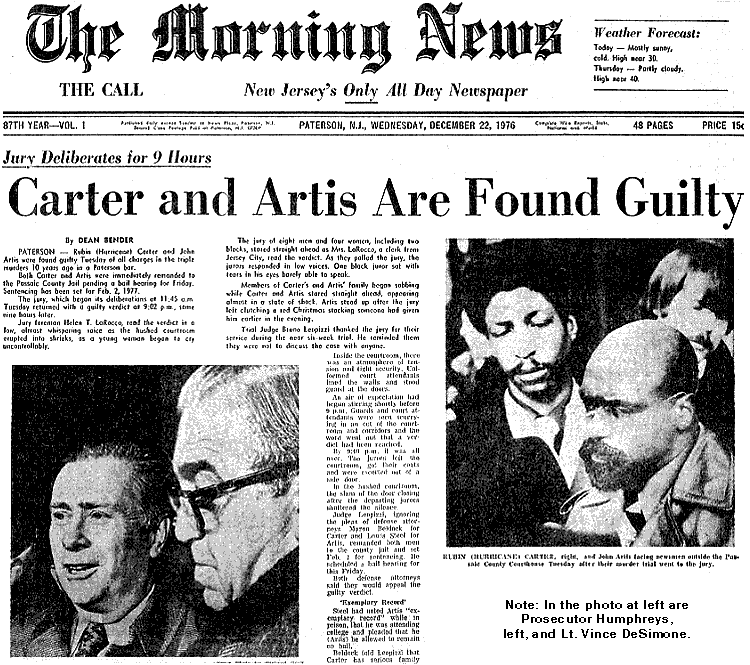Aristotle and the Hurricane


Aristotle asks us to “let rhetoric be defined as an ability, in each particular case, to see the available means of persuasion” (37). He sees rhetoric as the speaker’s ability to recognize what may be the most effective way to get your point across in a given situation. Perhaps this understanding of rhetoric is what Dylan had in mind when he set about to write “Hurricane” as the most effective way to plead the injustices surrounding the incarceration of champion boxer Rubin “Hurricane” Carter in 1966. Carter, who was a professional middle-weight boxer, was arrested for a triple homicide at a bar in Paterson, New Jersey and ultimately convicted with little evidence. The case was controversial because Carter and his friend John Artis (both African-American) were picked up by the police after two bar customers identified the assailants as two black males; however, neither customer identified Artis or Carter as the assailants themselves. Despite little physical evidence and witness recantation, Carter and Artis were arrested, charged, tried, and convicted. Dylan knew about the case and read Carter’s autobiography. He suspected the incident to be racially motivated and he visited Carter in jail in 1975. Shortly after the visit, Dylan wrote “Hurricane” as an attempt to expose the incident for what he believed it to be: Carter was innocent and was the victim of racial profiling. After the popularity of Dylan’s song, Carter received a new trial (and was convicted again), but was finally released from prison in 1985.
Dylan’s song had such an immediate and significant impact because it followed the Aristotelian ideals of rhetoric. Carter may not have the power to plead his case, but Dylan was known at the time for his social and political capital through his well-known protest songs. Perhaps Carter reached out to Dylan because he knew that Dylan would have the ability to recognize the available means of persuasion: the protest song. With the creation of this song, Dylan uses the Aristotelian triad of ethos, pathos, and logos to most effectively persuade his audience. Aristotle recognizes the importance of establishing ethos in rhetoric because “there is persuasion through character whenever the speech is spoken in such a way as to make the speaker worthy of credence; for we believe fair-minded people to a greater extent and more quickly than we do others, on all subjects in general and completely so in cases where there is not exact knowledge” (38). By this time, Dylan had already been touted as the voice of his generation and many people looked to him to reveal truths about the lives that they were leading and would most certainly consider him to be “worthy of credence” and “fair-minded,” which are at the very foundation of establishing ethos for Aristotle. Having already established his ethos with his reputation, Dylan employs both logos and pathos in the lyrics of the song to most effectively persuade his audience. Aristotle asserts that “persuasion occurs through the arguments (logoi) when we show the truth or the apparent truth from whatever is persuasive in each case” (39). The song begins with a setting of the scene that almost reads like stage directions and this objective description sets up the facts or logical arguments of the case. He goes on to describe the scene and to tell the facts of the story using specific names of people involved and quotes from the people themselves.
However, Dylan does not just rely on logic or facts to persuade his audience, he has to appeal to their emotions as well because as Aristotle claimed “there is persuasion through the hearers when they are led to feel emotion (pathos) by the speech; for we do not give the same judgment when grieved and rejoicing or when being friendly and hostile” (39). In order to appeal to the emotions of his audience, Dylan often lets the injustices of the story speak for itself; however, the most-recognizable pathetic appeal of the song occurs at the end of the first verse and repeated again as the only recognizable chorus of the song. Throughout the song, Dylan sings that Carter was “put into a prison cell, but one time he could-a been the champion of the world.” This verse functions as a pathetic appeal because it makes the audience feel sorry for Carter—if only he hadn’t been wrongly imprisoned, he could have been a world-champion boxer. Later in the song, Dylan again refers to Carter as a “number one champion” although he was ranked number six at the time of his arrest and had never been ranked higher than three in his boxing career. Many critics have claimed that Dylan took too excessive poetic license with his portrayal of Carter, but I think that he was building this champion-status of Carter as a pathetic appeal. (Although I also think that the line between appealing to the emotions and using poetic license is especially blurry). However, Dylan continues this pathetic portrayal throughout the song with lines such as “here’s the story of the Hurricane—the man the authorities came to blame for somethin’ that he never done” and “an innocent man in a living hell.” He even compares Carter to a religious figure with “Now all the criminals in their coats and their ties are free to drink martinis and watch the sun rise while Rubin sits like Buddha in a ten-foot cell.” Through the employment of pathos, Dylan is able to effectively persuade his audience by portraying Carter as the victim while strengthening his argument through the logical facts of the case. The strength of Dylan’s argument and his ability as a rhetorician is evident in the fact that the song (the means of persuasion) drew enough publicity to garner a new trial for Carter and to keep this horrible act of racism in the public eye and consciousness.
Aristotle. On Rhetoric: A Theory of Civic Discourse. Trans. George A. Kennedy. Oxford: Oxford University Press, 2007.